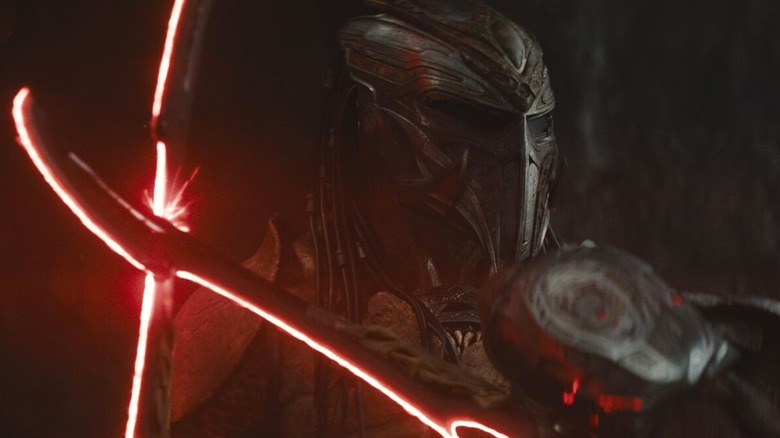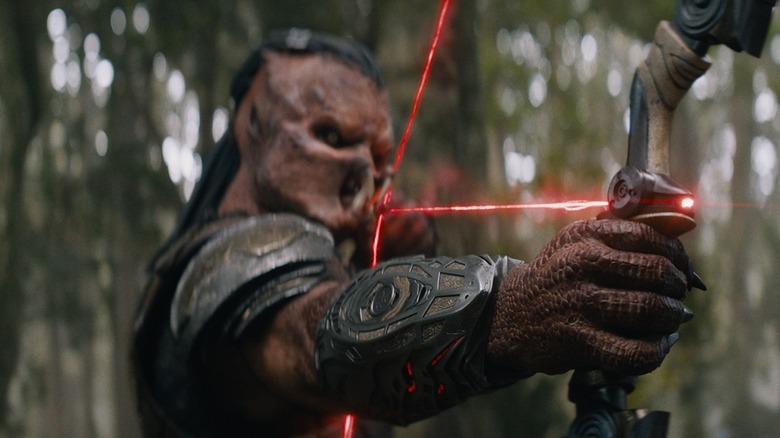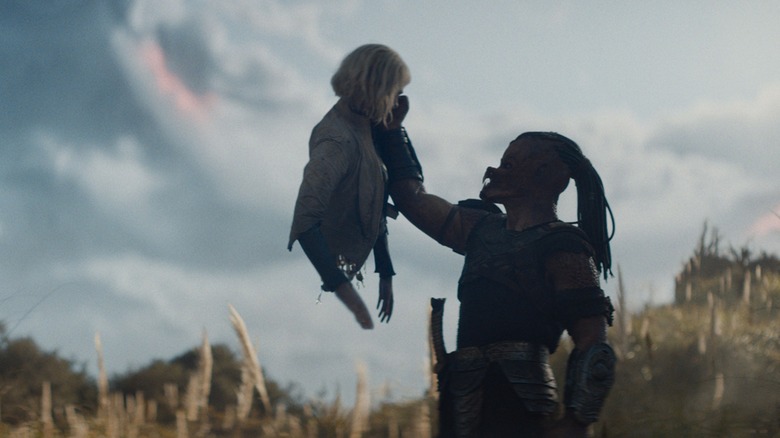Predator: Why Hunting Is At The Core Of The Yautja Culture, Explained
This post contains spoilers for the "Predator" franchise.
Dan Trachtenberg's "Prey" reinvigorated the "Predator" franchise in 2022, and his latest, "Predator: Badlands," solidifies the long-standing appeal surrounding these extraterrestrial creatures. The classic "Predator" films, combined with every crossover "Alien vs. Predator" offering (alongside expanded media), already boast an impressive legacy, but Trachtenberg's films explore distinct facets of Yautja lore and their relationship with other species.
For instance, "Predator: Badlands" revolves around Dek (Dimitrius Schuster-Koloamatangi), a young Yautja who is forced to prove himself — but he cannot do so without Weyland Yutani synthetic Thia (Elle Fanning), who remains strapped to his back at all times. Dek's obsession with hunting the deadly Kalisk forms the crux of the film, as he is adamant to find his worth in a tangible trophy that can be brandished.
Dek is one among many of his kind who construct their identity around hunting. This begs the question: Why is hunting such a core tenet of Yautja culture? Schuster-Koloamatangi spoke to Men's Health to shed light on this aspect:
"The whole reason they even hunt the way that they do is because they used to be oppressed, and the way they came out of oppression was through hunting. The first trophy that was taken was of the oppressors. They take trophies in honor of their ancestors. It's not something they just do because it's brutal. That's something a lot of people confuse about Yautja when they see them in previous 'Predator' movies [...] But there's a reason they're doing it. There's a lot of honor in it for them, and it's part of a code they follow."
To better understand this code of honor, we must dive deeper into Yautja history and the actions of Kaail, also known as the Alpha Predator, or the First Hunter.
The first instance of hunting for the Yautja was born out of necessity
The Hish-qu-Ten were ancestors of the Yautja, and they were enslaved by an alien race known as the Amengi thousands of years ago. Kaail, a chemically-enhanced Hish, was born into slavery and trained to be a fighter for the entertainment of his captors. While Kaail's physical prowess was a cut above the rest, he also nurtured a strong spirit of rebellion and held deep resentment towards the Amengi. The path to freedom, however, wasn't easy, as Kaail had to put on an amicable front while secretly allying himself with other physically strong Hish. As strength would determine the outcome, Kaail prioritized organized brute strength to annihilate the Amengi, whose carcasses were fashioned into masks and armor by him.
Kaail's unforgettable legacy as the First Hunter established a culture that rewarded the strongest, and the brutality inherent in the hunt was simply born from the wariness that came with hard-earned freedom. Schuster-Koloamatangi delved deep into these stories featured in the Dark Horse Comics to better understand Predator culture, as it explained why strength-based brutality is so commonplace in Yautja society. As their whole society is built on hunting, those who are perceived as weak (like Dek) are culled, as a lack of honor immediately translates into collective shame. "They can't live properly within their society if they are not elite hunters," the actor further clarifies, which explains why Dek goes to such lengths and ventures into the "death forest" to bring honor to his people.
Empathy or vulnerability aren't aspirational traits among the Yautja, but Dek discovers these sentiments through Thia and the adorable Bud. He does hunt the deadliest prey in the end, but the definition of the term changes drastically with his growth as a character.
The rigidity of the Yautja code of honor has its downsides
Ritualistic hunting of dangerous lifeforms is the very foundation of Yautja society, which is why Dek chooses the Kalisk, which even his father Njohrr (Reuben de Jong) is afraid of hunting. It is commonplace for Predators to travel huge distances for the hunt and kill them as per their own preferences. Defeat is not an acceptable outcome here, as it is followed by the Yautja version of honorable suicide. In some cases, like that of Dek, he was marked for death even before his hunt, as his father saw him as a liability to the clan's reputation. Schuster-Koloamatangi elaborates on this mindset:
"He's [Dek] trying to live up to this symbol of what it takes to be a Yautja [...] If you're not pulling your weight, if you can't elevate yourself to where you need to be, then you have no value within their societal system. Because he's the size he is as a Yautja, Dek has to try even harder to earn his stripes, and he's an outcast because of it. He's seen as a weakling. He's trying to live up to their standards, but at the same time he's trying to find—within himself—who he is. He may not fit into this one system, but that doesn't mean that he has no value, full stop."
Full stop, indeed. Dek's personality becomes more complex and nurturing as the film progresses, as he is exposed to other forms of honor, validation, and acceptance that are different from the rigidity of the Yautja code. He finds his own clan by the end, and Njohrr pays a heavy price for having heartlessly brutal expectations from his own sons.
"Predator: Badlands" is currently playing in theaters.


